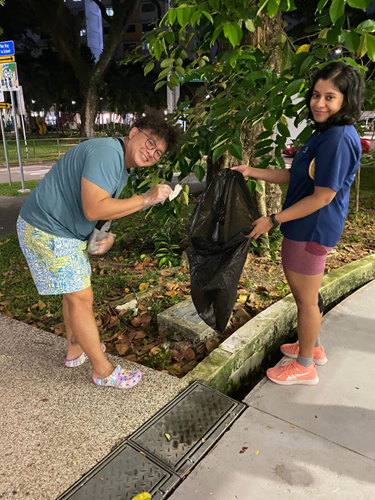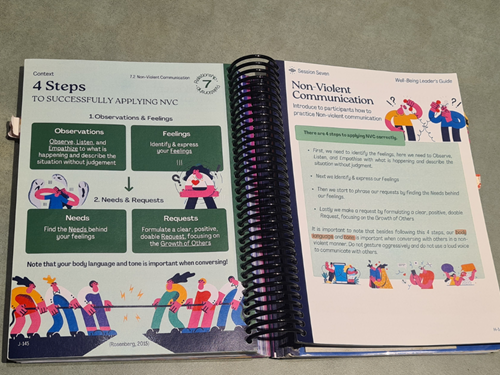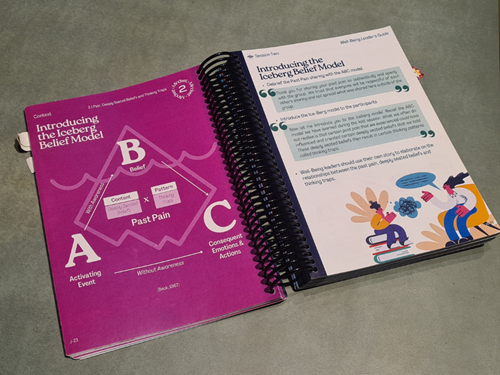When faced with stressful or upsetting situations, some might struggle to find the right methods to cope. Having tools that lay out a step-by-step process to navigate these difficult emotions can be helpful especially for those who feel lost in a downward spiral.
To build mental resilience in our communities, the Happiness Initiative curated the Well-Being Circles (WBC) programme – a 12-session community initiative, focusing on enhancing well-being skills and nurturing social support.
In partnership with National Youth Council and SG Mental Well-Being Network, WBC covered several themes of mental well-being. These include mindset, passion, purpose, relationships and other-centeredness.
Based on the pilot supported by the Ministry of Culture, Community and Youth (MCCY), WBC has trained over 600 individuals in peer support skills, with 26-year-old Melia Sin being one of them.
As a Well-Being Leader, Melia attended a two-day workshop which taught her the well-being skills she was to impart to the participants.

Seeing the extensive content that was included in the programme, Melia was initially daunted by the task of facilitating the WBC programme for a group of participants. She felt doubtful of her capabilities due to her young age.
“I asked myself if I was really in a position to share more about this with people who were older than me. But I was reassured that I was capable of creating a space for people to feel comfortable to share, which was the most important part.”
To attest to that, Hasisha, a 31-year-old participant of the programme, felt that she could be open with others despite having to change groups halfway through the WBC programme.
She had joined the second run of the programme in January 2023, as she identified with the programme’s aim of imparting education and skills for empowerment for everybody.

Hasisha felt a sense of solidarity with the other participants during the sessions. Photo Credit: Hasisha
“It was the first time I had come across a structured well-being awareness programme grounded in research and I was curious to see how it would feel to be part of such an initiative that builds community amongst its circles,” Hasisha shared.
She felt more encouraged as she has been able to move towards her mental-health goals by using resilience strategies taught by the programme.
She said: “I had deep-seated beliefs that held me back. The resilience strategies and affirming action, helped me break through that.”

Hasisha is now also a Well-Being Leader for the upcoming session of WBC in April 2024. Photo Credit: Happiness Initiative.
Even as a leader, Melia had her own breakthrough where she realised an unhealthy habit of keeping things to herself. She had a fear of expressing herself due to judgement from others.
“I learnt about non-violent communication and it was a very clear way for me to open up the conversation and make known what were the needs behind my feelings.”

According to Happiness Initiative’s research, most of the participants engaged in more prosocial behaviours after the programme. Photo Credit: Youthopia/ Nabilah Ismail
After applying lessons from the programme, she describes an improved personal relationship after using the newfound approach to communicate with her loved ones.
Melia also spoke about another well-being skill the programme taught her - the ABC model, which stands for “Activating Event, Belief and Consequent emotions and actions”. This was something that allowed her to make sense of the feelings of anxiety she had after graduation.

Happiness Initiative records that positive effects are sustained at least 6 months after the programme ended. Photo Credit: Youthopia/ Nabilah Ismail
Upon browsing job directories (Activating Event), her belief that she was unworthy led to fear and anxiety (Consequent Emotion). She reframed her belief and embraced that she was on her own unique journey. When she prioritised fulfilment instead, her job-hunting anxiety greatly reduced.
“I thought that I had no control over my emotions, but then this really helped me see that differently.”

Within her group, Melia tried to create an environment of safety where everyone would feel the self-motivation to achieve their goals. Photo Credit: Happiness Initiative.
Melia strongly suggests that people who join Well-Being Circles should be at a point in their life where they want to make and sustain these changes.
“It’s difficult to carry out these actions for positive changes for yourself. I made a commitment to myself, in front of my participants, so there was an accountability to follow through and have that difficult conversation with my loved ones.”
Having regular sharings in a group setting helped participants like Hasisha share their experiences and listen to others’ as well.
“Sometimes we feel stuck and having these regular sessions with others, learning coping skills together, helps open up new pathways and perspectives.”
The Well-Being Circles will be organising future sessions in July and August where new participants can register to join. More details can be found on the Well-Being Circles website.





